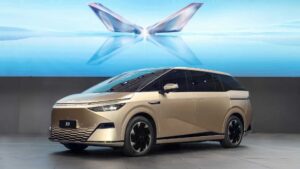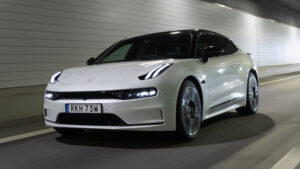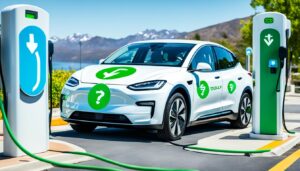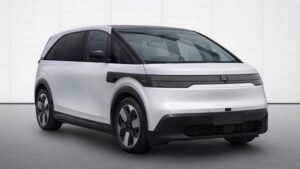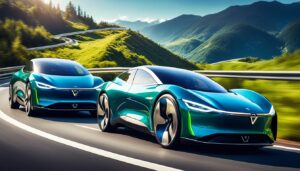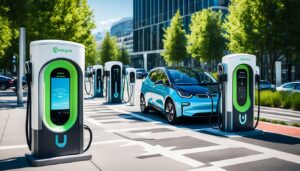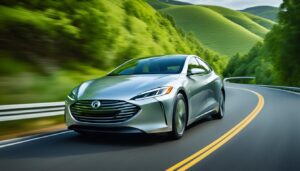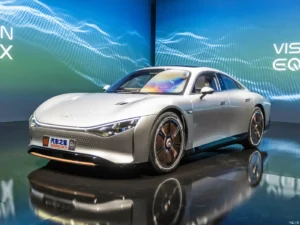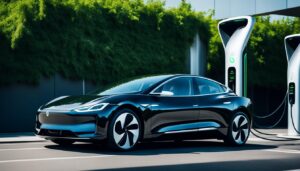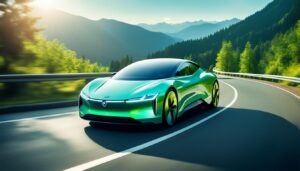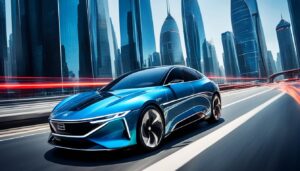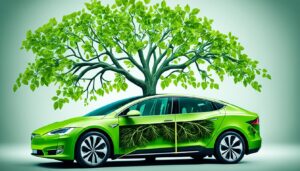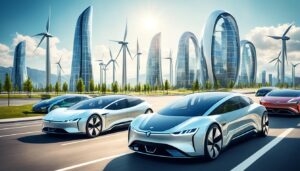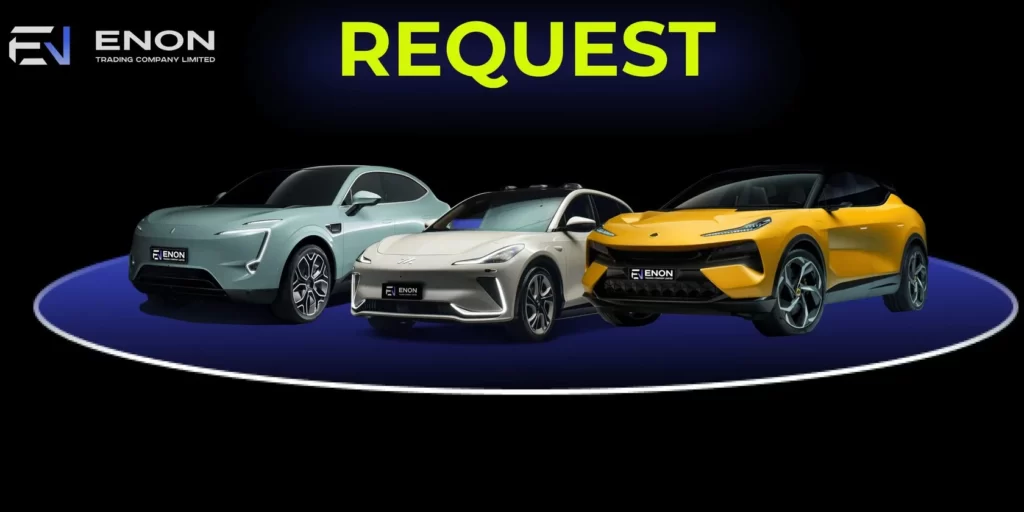Did you know that hybrid cars can reduce fuel consumption and emissions by up to 30% compared to conventional vehicles? This surprising statistic highlights the significant impact that hybrid technology can have on creating a more sustainable future. With increasing concerns about the environmental impact of transportation, hybrid cars are becoming an increasingly popular choice for eco-conscious drivers.
Hybrid cars offer a range of benefits that go beyond just fuel efficiency and reduced emissions. From cost savings to government incentives, hybrid technology is revolutionizing the way we drive. In this article, we will explore the various advantages of hybrid cars, their positive environmental impact, and the advancements in hybrid technology that are shaping the future of transportation.
Key Takeaways:
- Hybrid cars can reduce fuel consumption and emissions by up to 30% compared to conventional vehicles.
- Hybrid cars offer cost savings through reduced fuel consumption and lower maintenance costs.
- Many governments provide incentives such as tax credits and reduced registration fees for hybrid car owners.
- Hybrid cars have a positive environmental impact by reducing air pollution and mitigating climate change.
- Advancements in hybrid technology are leading to more efficient and capable hybrid vehicles.
Enhanced Fuel Efficiency and Reduced Emissions
One of the main benefits of hybrid cars is their enhanced fuel efficiency. By combining an internal combustion engine with an electric motor, hybrid cars can achieve higher miles per gallon (MPG) compared to traditional gasoline-powered vehicles. This leads to savings on fuel costs for the drivers.
Additionally, hybrid cars emit fewer greenhouse gases and pollutants, reducing their environmental impact and contributing to cleaner air quality. The integration of electric power in hybrid vehicles allows for more efficient use of fuel, as the electric motor assists the combustion engine during acceleration and deceleration. This results in reduced fuel consumption and lower emissions.
Hybrid cars utilize regenerative braking systems that capture and store energy that would otherwise be wasted. This energy is then used to power the electric motor, further improving fuel efficiency. The combination of these technologies enables hybrid cars to maximize their energy efficiency, making them an eco-friendly choice for environmentally conscious drivers.
Hybrid cars offer a win-win situation for drivers and the environment. Not only do they save money on fuel costs, but they also help reduce air pollution and combat climate change.
To illustrate the fuel efficiency and emissions reduction benefits of hybrid cars, take a look at the comparison table below:
| Vehicle | Fuel Efficiency (MPG) | CO2 Emissions (g/mi) |
|---|---|---|
| Hybrid Car A | 50 | 100 |
| Gasoline Car B | 30 | 150 |
| Hybrid Car C | 45 | 90 |
In the above table, Hybrid Car A achieves 50 MPG and emits 100 grams of CO2 per mile, while Gasoline Car B only manages 30 MPG and emits 150 grams of CO2 per mile. Hybrid Car C falls between the two with 45 MPG and 90 grams of CO2 per mile. As you can see, hybrid cars offer significant improvements in both fuel efficiency and emissions reduction compared to their gasoline counterparts.
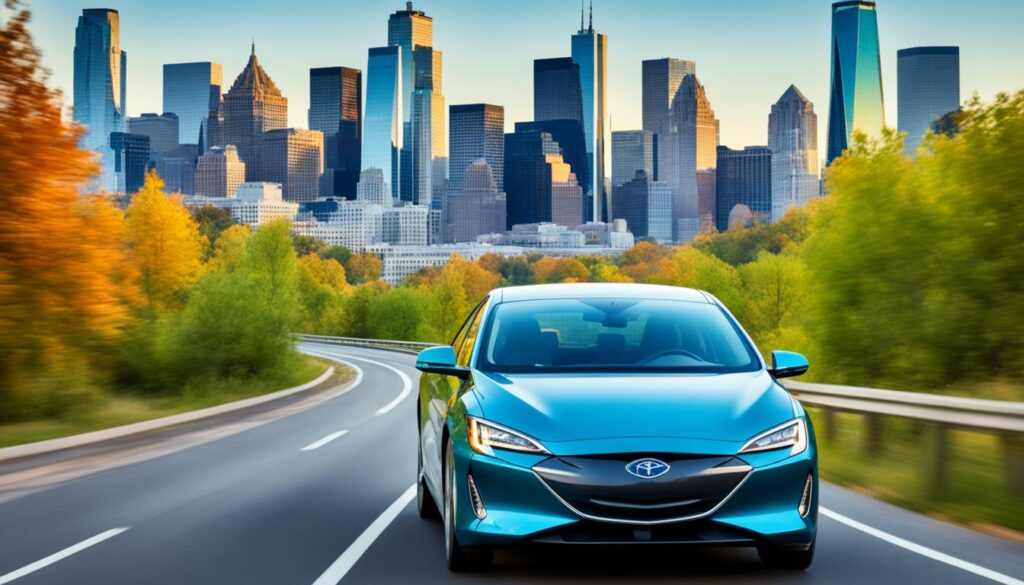
With their enhanced fuel efficiency and reduced emissions, hybrid cars play a vital role in promoting sustainable transportation and mitigating the environmental impact of driving.
Cost Savings and Government Incentives
When it comes to owning a hybrid car, there are clear financial advantages. Not only do these eco-friendly vehicles offer benefits such as reduced emissions and fuel efficiency, but they can also lead to substantial cost savings over time.
One of the primary ways hybrid cars help drivers save money is through improved fuel efficiency. By combining an internal combustion engine with an electric motor, hybrid vehicles can achieve higher miles per gallon (MPG) compared to traditional gasoline-powered cars. This means less frequent visits to the gas station and more money left in your pocket.
In addition to fuel savings, hybrid cars often have lower maintenance costs. The hybrid technology used in these vehicles allows for less wear and tear on the engine, resulting in longer-lasting components and fewer repairs. This can translate into significant long-term savings for hybrid car owners.
Furthermore, governments around the world recognize the importance of promoting eco-friendly transportation and offer various incentives to encourage the purchase of hybrid cars. These incentives can include tax credits, rebates, and reduced vehicle registration fees. Taking advantage of these government initiatives not only reduces the upfront cost of buying a hybrid car but also provides ongoing financial benefits.

By harnessing the power of hybrid technology, drivers can reap the benefits of reduced fuel expenses and lower maintenance costs. The cost savings associated with owning a hybrid car, combined with government incentives, make these vehicles a financially wise choice for eco-conscious individuals.
Environmental Impact and Sustainability
Hybrid cars have a positive environmental impact by reducing fuel consumption and emissions. This plays a crucial role in minimizing air pollution and mitigating climate change. By embracing hybrid technology, we contribute to a more sustainable future and help conserve natural resources. Hybrid cars are an integral part of the transition to a greener transportation system and a reduced dependence on fossil fuels.
| Environmental Impact | Sustainability |
|---|---|
| Reduced fuel consumption | Promotes a cleaner, greener future |
| Lower emissions | Minimizes air pollution and climate change |
| Conserves natural resources | Reduces dependence on fossil fuels |
Reduced Fuel Consumption
Hybrid cars are known for their fuel efficiency. They use a combination of electric motors and internal combustion engines, allowing them to consume less fuel compared to conventional vehicles. This results in fewer carbon dioxide emissions and a reduced carbon footprint. By opting for hybrid cars, we contribute to a cleaner and more sustainable environment.
“By reducing fuel consumption, hybrid cars help mitigate the environmental impact of driving.”
Minimizing Air Pollution and Climate Change
Hybrid cars emit lower levels of pollutants and greenhouse gases compared to traditional cars. The reduced emissions contribute to improved air quality and help combat climate change. With hybrid technology, we can make a significant impact on reducing pollution and protecting the planet for future generations.
Conserving Natural Resources and Reducing Dependence on Fossil Fuels
Hybrid cars contribute to sustainability by conserving natural resources. With improved fuel efficiency, they require fewer fossil fuels for operation, reducing the extraction and depletion of these limited resources. By embracing hybrid technology, we pave the way for a more sustainable future with cleaner energy alternatives.
Advancements in Hybrid Technology
Hybrid technology is constantly evolving and improving. Engineers and automakers are continuously working to enhance the performance, efficiency, and reliability of hybrid cars. These advancements in hybrid technology contribute to a range of benefits for hybrid car owners, including:
- Better Fuel Efficiency: Through innovations in battery technology and powertrain systems, hybrid cars have become more fuel-efficient than ever before. This means drivers can go further on less fuel, resulting in cost savings and reduced environmental impact.
- Increased Range: Improvements in battery technology have allowed hybrid cars to have a longer electric driving range. This enables drivers to rely more on electric power and less on the internal combustion engine, further reducing fuel consumption and emissions.
- Improved Driving Experience: Advancements in hybrid technology have also led to enhancements in the overall driving experience. From smoother transitions between electric and gasoline power to optimized power delivery, hybrid cars now provide a more seamless and enjoyable driving experience.
Additionally, hybrid cars benefit from regenerative braking systems that capture and store energy normally lost during braking. This energy can then be reused to power the vehicle, further enhancing efficiency. Furthermore, automakers are exploring new materials and designs to make hybrid cars lighter and more aerodynamic, promoting even greater fuel efficiency.
These advancements in hybrid technology demonstrate the commitment of the automotive industry to create greener and more sustainable transportation options. By continuously pushing the boundaries of hybrid technology, engineers and automakers are shaping the future of eco-friendly driving.
Explore the Evolution of Hybrid Technology
To illustrate the evolution of hybrid technology, take a look at the timeline below:
| Year | Advancement in Hybrid Technology |
|---|---|
| 1997 | The Toyota Prius is introduced, becoming the first mass-produced hybrid vehicle. |
| 2004 | Honda introduces the Integrated Motor Assist (IMA) system in the Honda Civic Hybrid, enhancing fuel efficiency. |
| 2010 | Automakers start incorporating lithium-ion batteries in hybrid cars, improving energy storage capacity. |
| 2016 | The Chevrolet Volt is unveiled, featuring an extended electric driving range and a gasoline engine as a backup power source. |
| 2020 | Hyundai releases the Sonata Hybrid with a solar roof, harnessing solar energy to power various vehicle systems. |
Conclusion
Hybrid cars offer numerous benefits that make them an excellent choice for eco-friendly driving. Their enhanced fuel efficiency and reduced emissions make them a greener option, reducing their impact on the environment. Moreover, hybrid cars provide cost savings through reduced fuel consumption, helping drivers save money in the long run. Additionally, governments around the world often provide incentives, such as tax credits, rebates, and reduced registration fees, to encourage the adoption of hybrid technology.
Choosing a hybrid car not only benefits individual drivers but also has a positive impact on our environment and future sustainability. By reducing fuel consumption and minimizing emissions, hybrid vehicles contribute to cleaner air quality and help mitigate climate change. As more people recognize the advantages of hybrid cars, the demand for eco-friendly transportation continues to grow.
Furthermore, advancements in hybrid technology have led to improved performance, efficiency, and reliability in hybrid cars. Engineers and automakers are constantly innovating to enhance the driving experience and offer better fuel efficiency and increased range. These advancements are shaping the future of transportation, promoting a cleaner and greener world.
In conclusion, investing in a hybrid car not only provides immediate benefits such as cost savings and reduced environmental impact but also helps accelerate the transition towards a more sustainable future. The benefits of hybrid cars extend beyond individual drivers, positively impacting our society as a whole and paving the way for a greener, cleaner, and more efficient transportation system.
FAQ
What are the benefits of hybrid cars?
Hybrid cars offer a range of benefits, including enhanced fuel efficiency and reduced emissions. They provide cost savings through reduced fuel consumption and often have lower maintenance costs. Additionally, many governments offer incentives to encourage the purchase of hybrid vehicles.
How do hybrid cars achieve enhanced fuel efficiency?
Hybrid cars combine an internal combustion engine with an electric motor, allowing them to achieve higher miles per gallon (MPG) compared to traditional gasoline-powered vehicles. This leads to savings on fuel costs for the drivers.
Do hybrid cars emit fewer emissions?
Yes, hybrid cars emit fewer greenhouse gases and pollutants compared to conventional vehicles. This helps to reduce their environmental impact and contributes to cleaner air quality.
Can hybrid cars save me money?
Yes, hybrid cars can provide significant cost savings over time. Due to their improved fuel efficiency, drivers can save money on fuel expenses. Additionally, hybrid vehicles often have lower maintenance costs than conventional cars. Moreover, many governments offer incentives such as tax credits and rebates, which can further reduce the cost of owning a hybrid vehicle.
What is the environmental impact of hybrid cars?
Hybrid cars have a positive environmental impact. By reducing fuel consumption and emissions, they help to minimize air pollution and mitigate climate change. The use of hybrid technology promotes sustainability by conserving natural resources and contributing to a cleaner, greener future.
Are there any advancements in hybrid technology?
Yes, hybrid technology is constantly evolving and improving. Engineers and automakers are continuously working to enhance the performance, efficiency, and reliability of hybrid cars. Advancements in battery technology, regenerative braking systems, and powertrain technology have led to more efficient and capable hybrid vehicles.



